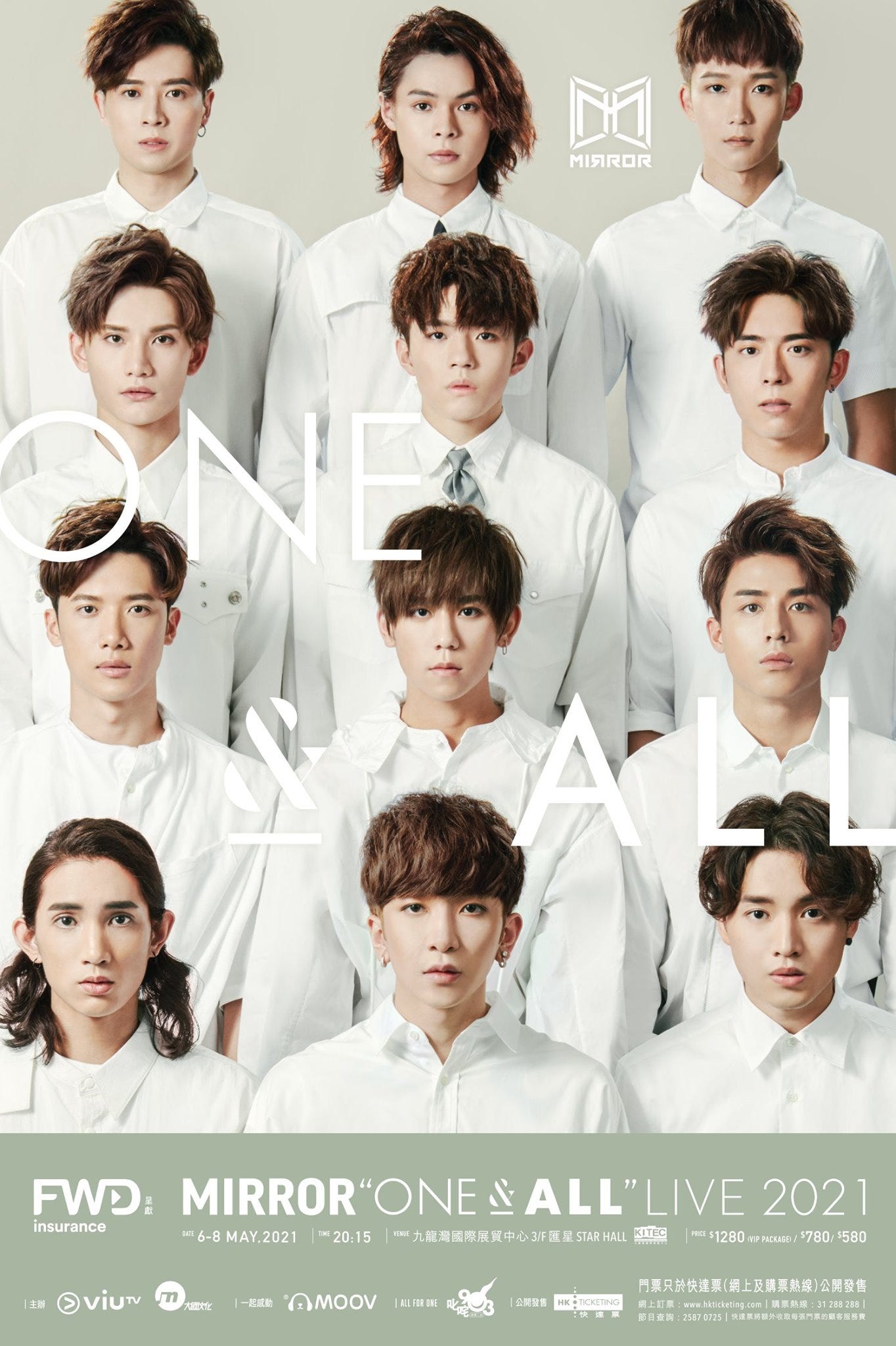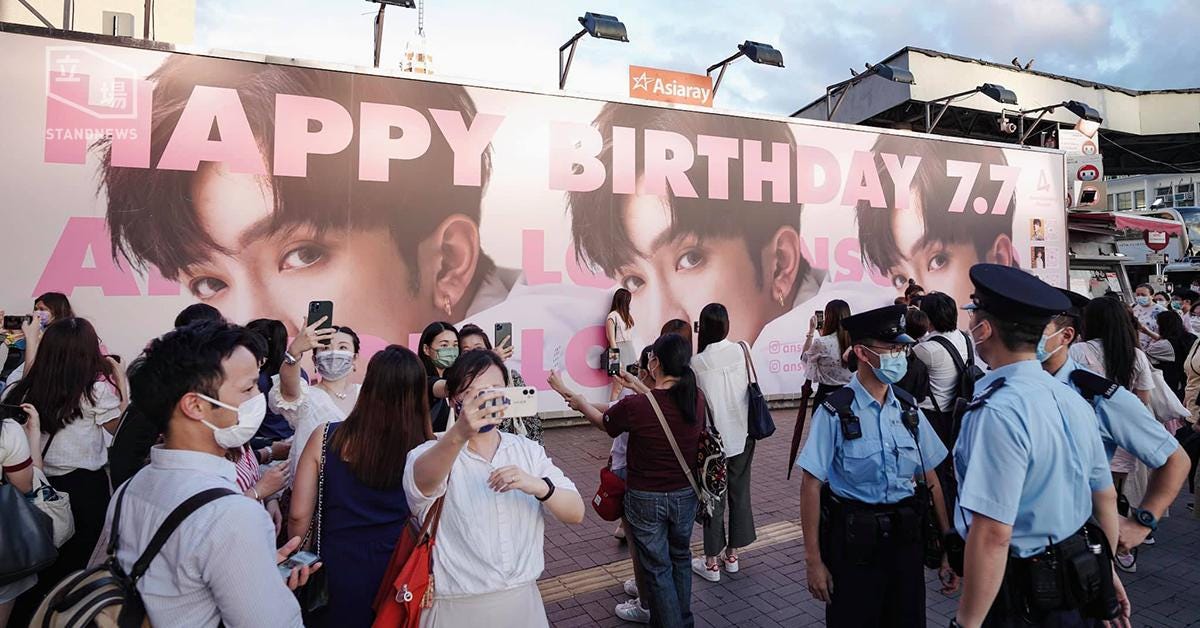Mirror of our times
Will this boy band save Hong Kong's media industry?
Around a month ago, the final episode of the Hong Kong remake of Ossan’s Love was aired on local free-to-air channel ViuTV. I stayed home and tuned in live, ads and all, something I have not done in almost a decade (I know because I never connected the TV cable in any of my HK apartments).
Warning: This newsletter is not about food.
It’s about Hong Kong’s media and entertainment industry, which I have not been interested in since sometime around 2006 (see: TV connection above). (By the way, in case you think I’m one of those ABCs who has never cared about HK/Asian entertainment, I grew up on TVB VHS tapes from Box Hill (a very specific reference for Melbourne HKers – hello friends!), Leon Lai, Jacky Cheung, Cass Phang, Sammi Cheng, Denise Ho, Stephen Chow, the Young and Dangerous movies etc. but yes, I’m “ABC” enough to know their English names).
So what’s changed? An inescapable boy band called Mirror.

About two months ago, I was on a shoot and chatting during a break. Somehow the subject turned to Keung To – I’d heard the name before, and that he had a McDonald’s ad with his take on the Big Mac rap, but confessed that I wouldn’t be able to recognise him. The person telling me about him was shocked and asked if I’d been living under a rock. I’ll confess that it was pretty embarrassing, after all, I’ve been in media a long time and am growing a production house and agency – I felt like I was living in an expat bubble, which is probably one of my worst nightmares, so I did a 180 and dove in deep.
I’ll spare you the introductions because, testament to their rising popularity, numerous English articles have been published about them, even in the NYT, but Keung To was the first breakout star in Mirror, the 12-piece boy band that was born out of ViuTV’s talent competition show called King Maker. (Side note: One of my weird buttons/triggers is that English media always likens Mirror to BTS, as if K-pop invented the giant boy/girl band model – can we please acknowledge Morning Musume, the original giant J-pop girl group founded in 1998! This is why we need more diverse writers in English media! This is a hill I will die on!!!). What’s interesting to me about this band isn’t really their performances (at least half of them can’t sing to save themselves), but the cultural phenomenon they’ve become. The group’s songs – whether released as Mirror or individual members – have been consistently topping local charts, be it radio or streaming, and they’ve even received a few local music awards. The finale of Ossan’s Love, the TV series featuring three Mirror members, hit a rating of 7.9 points (517,000 viewers), the highest in ViuTV’s short history. (In the same time slot, the city’s main channel TVB Jade hit a historic low of 14.2 points, or 930,000 – anything under a million for them is highly irregular). Their “fan economy” is doing wonders for everything from probiotics to real estate – Mirror fans are known to support their favourite members by buying everything they endorse, and also have helped boost their popularity by buying ad spaces themselves, from buses to billboards.

Digging a little further into advertising, this not-so-dirty dozen really have been the face of everything you can buy. The aforementioned Keung To, who did the McD’s rap, has also collaborated with Cartier alongside fellow group member Anson Kong, and has been the face of almost every HSBC product. Anson Lo, arguably the member of the moment thanks to his lead role in ViuTV’s boys’ love/comedy series Ossan’s Love, has been the face of everything from mattresses, to pet food (side note: his family’s dog, Amber, is super cute), to Charlotte Tilbury’s lipsticks. Frankie Chan, known for being a) unknown (well, the least known in the group) and b) the oldest, starred in a haemorrhoid cream commercial – no kidding.
In recent years, before the rise of Mirror, international brands had all but stopped using local pop stars for big campaigns, instead opting for big Korean, Mainland Chinese, Taiwanese and Japanese stars, since there were so few local stars that had enough clout. Right now, Jeremy Lee of Mirror is part of a huge VS Sassoon campaign that includes billboard ads and TVCs. Curious, I took a quick look at VS Sassoon’s Hong Kong YouTube page – previous “local” campaigns featured Korean G-Dragon, Taiwanese Gwei Lun-mei, and basically no Hong Kong celebs unless you count a tiny campaign with Jennifer Tse, but even that was three years ago.
Apart from getting the warm and fuzzies from seeing local faces on ads again, and giving me an ounce of hope that Hong Kong entertainment will again become powerhouse it once was in the 1990s (Stephen Chow, Anita Mui, Leslie Cheung, Sammi Cheng, Faye Wong, and Chow Yun-fat weren’t just icons in Hong Kong – the Asian diaspora, Chinese-speaking or not, went crazy for them. And let’s not forget Jacky Chan – I went to Kenya the year before last and when I said I was from Hong Kong, they responded with “Jacky Chan!”), this sudden interest in Mirror means there’s a whole lot more work locally for creatives. From advertising to movies, concerts and theatre, local work has been picking up for videographers, directors, producers, lighting technicians, make-up artists, stylists – you get the idea.
According to this report, in the first half of 2021, local Instagram ad spend was at HK$13.7 billion – a 35% year-on-year growth – and 27 of the top 50 Instagram advertisers in Hong Kong worked with members of Mirror or Error (another product of King Maker, they’re the jokey, “anti-idol” boy band).
A big question for marketers now is whether Mirror’s members are overexposed; already among clients there’s talk of purposely avoiding them (although I think it’s just sour grapes of not being able to book them), but that’s fine – what we’re witnessing is a cultural shift that’s much bigger than Mirror. A rising tide lifts all boats. Anecdotally at least, interest in local pop culture has risen. My own Spotify list now features the likes of Serrini, Gareth T., MC, AGA and Janice Vidal, names that I knew but didn’t care about enough to listen to – it was, seriously, an interest in what Mirror’s hype was all about that I started rooting around in the world of Cantopop/entertainment again. Other “niche” names, like actor, playwright and director Kearen Pang, who made her name on Hong Kong’s tiny theatre scene (I cried for the first time in a theatre because of her show, 29+1 – her shows are a must if you speak Cantonese and enjoy theatre), have benefited from Mirror’s rise too, becoming a mentor in King Maker II, and an acting teacher to Mirror members like Anson Lo. Local YouTubers like Asha and Trial and Error have gone mainstream (Asha starred in Ossan’s Love, and Trial and Error is a new-ish YouTube channel made up of actors and writers who also started out on YouTube but have dabbled in offline entertainment – T&L probably deserves another newsletter if we’re really digging deep into lihkg-forum-levels of local).
Unlike the 1990s, we now have social media (the Internet in general) and reality TV, which means pop stars’ ability to shift cultural tides are bigger than ever. The feeling of “authenticity”, whether real or designed, is now front and centre. In this article, an advertising exec is quoted as saying how “decidedly uncontroversial” Mirror are – that’s simply because in the Internet age, everything can be found online. There’s even a corner of Instagram that is dedicated to Mirror “archaeology” – digging up old clips, photos and screenshots from before they were famous. Anyone can go back into ViuTV’s archives and stream the television debuts of all Mirror’s members in just a few clicks. Their past lives and other typical local gossip rag fodder are more or less public knowledge – a few Mirror members have steady partners and aren’t afraid to be seen with them, Anson Lo’s “outing” by a local media outlet was heavily shat on by fans who knew he was gay anyway, and Mirror’s other Jeremy, better known as Jer, still proudly has an IG highlight from his old busking days (and to my knowledge, most Mirror members run their own Instagram accounts and vlogs on YouTube).
Western media (also see NYT article linked above) likes to tie every piece of Hong Kong coverage to the city’s political struggles, and has framed Mirror as a bit of a symbol for the city’s democratic spirit, but the group is not likely to stand for anything either way, not just because of the National Security Law, but because it’s owned by PCCW. A creation of ViuTV and signed to the record label Music Nation, they’re every bit a part of billionaire Richard Li’s telecoms and media empire. As much as Hongkongers like to check whether a business is “blue” (pro-establishment) or “yellow” (pro-democracy), when it comes to these twelve, we’ll just have to leave that all aside and enjoy their dance moves and CP cuteness. (For some proper HK pro-democracy music, I would recommend Explicit Comment (人話) by Charmaine Fong.)
To bring this back to food (tangentially) – let it be known that I’ve invented a new HK pop culture-specific drinking game while we were enjoying all the eel, sake and special-edition umeshu (a perfect blend of liquors made from ripe and underripe plums) at Tatler Dining Kitchen’s Uza pop-up. The game is simple: name all twelve members of Mirror without any clues (that includes looking at photos!). For every member you can’t name, you down a shot. Chin-chin!
